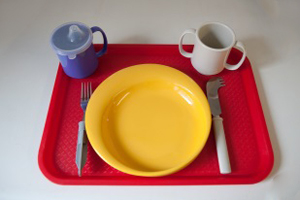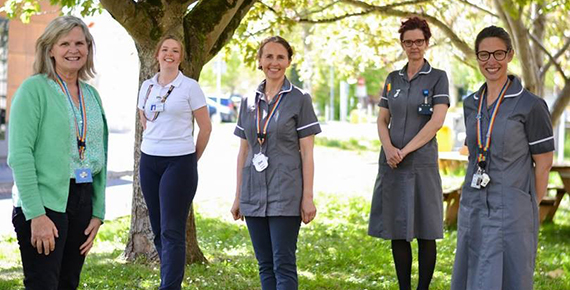Staying in Hospital
Dementia Care
Being in Hospital with Dementia
Being an inpatient in hospital can be difficult for people who have dementia.
Sometimes they can become more confused and disorientated, their dementia may appear more severe and they may behave in unfamiliar ways during this time.
What can help people with dementia in hospital?
- Having familiar things around them, such as photos of family or pets, or a favourite thing such as a blanket or cushion nearby
- Completing the "This is Me" document
- Trying to keep your relatives routine as close to normal as possible
- Being encouraged to eat and drink well

Red Tray Scheme
What can the hospital do
At the RUH we want to work in partnership with relatives and carers of patients with Dementia.
We operate flexible visiting for our patients whilst in hospital, and encourage close family or carers of patients with dementia to visit at meal times to encourage patients to eat and drink.
We also have a red tray scheme to improve eating and drinking.
Dementia Co-ordinators
The Dementia Coordinators provide a service to support staff caring for patients with dementia. Their role is to improve the experience of patients and carers affected by dementia. They will engage with and involve carers, plan for discharge and ensure better support at home to avoid unnecessary readmissions to hospital in the future.

Dementia Coordinators at the RUH: (L to R) Theresa, Julia, Dee, Ruth, Astrid
The specialist dementia care team are known as the Dementia Coordinators. You can contact them on Tel: 01225 824245 to talk to them directly or leave a message.
Technology support in the care of people with dementia
Dementia can make day to day living more difficult and frustrating. Simple tasks such as finding the house keys or forgetting to turn the bath taps off can be annoying or even hazardous. There have been advances in technology that in certain situations can help to make daily living much easier for people who have dementia and for those that care for people with dementia.
The term "assistive technology" refers to a devise or a system that allows a person to perform a task which they would otherwise be unable to do, or makes it easier or safer for that person to be able to undertake that task. There is an interactive information stand in the Atrium of the main hospital or a practical demonstration can be arranged in the demonstration room in the Physiotherapy Department, where patients or their carers can arrange to try out equipment or receive some advice on how to access these services from their own homes.
If you require more information about Telecare, contact:
01225 824245
Support at home


Age UK's Dementia Service supports people living with dementia upon discharge from hospital.
They offer practical support, companionship and signposting to services that could improve quality of life for people once they are home.
Grace and the Carers' Centre can meet with families, friends and neighbours of patients, in the hospital and at home. They can provide a person-centred and comprehensive carers plan; offering information, advice and emotional support to carers, as well as helping them to access a break.
Amanda and Grace can meet with you in the hospital. Please call Amanda on 01225 825321 or Grace on 07909 920175.
Useful links
Below you will find links to other websites you may find useful.
Dementia Service Development Centre
Department of Health Dementia Challenge
NICE Quality Standard for Dementia
RICE Research Institute for the Care of Older People Challenging Dementia
Royal College of Nursing Dignity and Dementia
Social Care Institute for Excellence
South West Dementia Partnership
Stirling Dementia Services Development Centre

